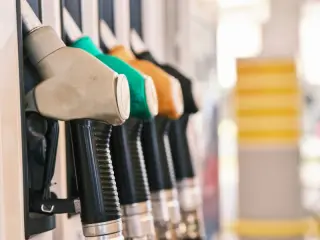
If you've ever left your car unused for a while, you might have wondered: how long does fuel last? Can petrol or diesel go off, and what happens if you use old fuel?
In this guide, we’ll break it down in plain English, answering all your key questions around fuel shelf life, safety, and storage.
How Long Does Fuel Last?
The short answer? Fuel doesn’t last forever.
Petrol shelf life: Unleaded petrol typically lasts around 6 months when stored properly. In a vehicle, however, it can start to degrade within about 3–6 months, especially if exposed to temperature swings.
Diesel shelf life: Diesel typically lasts longer, often lasting up to 12 months under the right conditions. But after that, it can start to form sediments and degrade.
Both fuels can deteriorate faster if exposed to air, moisture, or big temperature changes – keeping them in the right conditions is essential.
If your business manages a fleet, regular usage and planned refuelling (with a reliable fuel card) can help prevent issues with stale fuel sitting in vehicles too long.
Does Petrol Go Off? How to Tell if Fuel Has Gone Bad
Yes, petrol does go off. And when it does, you might notice:
A sour, varnish-like smell
Difficulty starting the engine
Rough idling or misfires
Loss of engine power
The RAC points out that degraded fuel can damage internal components over time, so it’s not just about inconvenience; it can become expensive too.
Problems Caused by Old Fuel
Using fuel that's past its prime can cause:
Blocked fuel injectors
Corroded fuel lines
Clogged filters
Engine hesitation or stalling
If you're managing multiple vehicles, keeping tanks fresh is key. That’s why many fleets benefit from fuel management tools to track usage and schedule timely refuels.
Is It Safe to Drive With Old Fuel?
Technically, you can drive on slightly old fuel, but it’s not recommended.
Small amounts of ageing petrol or diesel mixed with fresh fuel are usually fine, but if the fuel is more than a year old, or if the car’s been left standing for months, it’s safer to drain and replace it. Using very old fuel risks serious engine damage that’ll cost you more than just disposing of the old fuel in the first place.
If you suspect bad fuel, it’s best to consult a mechanic before hitting the road.
How to Store Fuel Safely
If you need to store petrol or diesel, keep these tips in mind:
Use a proper, sealed container approved for fuel storage
Store in a cool, dry place away from direct sunlight
Keep it away from sources of ignition (including static electricity)
Label containers with the date of storage
Good storage can make a big difference in how long your fuel lasts. But even the best conditions won’t make fuel last indefinitely.
How Much Fuel Can You Keep at Home?
By law in the UK, you can store:
Up to 30 litres of petrol at home without notifying your local Petroleum Enforcement Authority (PEA)
This can be split across appropriate containers (e.g., two 10-litre metal cans and one 10-litre plastic can)
Diesel rules are less strict for private use, but safe storage practices still apply. Always check current regulations if you’re unsure, especially for business purposes.
How Long Can Petrol Be Stored?
Stored correctly, petrol can last up to 6–12 months before it degrades significantly. After that, its performance quality drops quickly.
For diesel, you might get closer to 12–18 months with good storage, but again, conditions are critical.
Remember: fuel is cheaper than repairs. When in doubt, replace it.
How to Extend Fuel Shelf Life
A few tips to make your fuel last longer:
Store it in airtight containers
Keep it out of direct sunlight and extreme temperatures
Use fuel stabilisers for longer-term storage
Rotate stock if you store larger quantities
These steps can help delay problems like "fuel separation" or "diesel bug" (a microbial growth that can occur in diesel tanks).
What to Do With Bad Fuel
If you find bad fuel, don’t pour it down a drain or into the environment, it’s illegal and harmful.
Instead:
Contact your local recycling centre (many have hazardous waste disposal options)
Hire a professional service to remove contaminated fuel from vehicles or tanks
Proper disposal protects not just your engine, but the environment too.
Final Thoughts
Fuel might seem like a simple part of life, but letting it sit too long can cause big headaches. Whether you're asking "how long does petrol last in a car?" or "does diesel go off?", the takeaway is the same: fresh fuel = healthy vehicles.
For drivers and businesses alike, smart fuel management is key. If you’re looking to stay in control, our fuel card solutions can help you manage fuel usage, access competitive rates, and keep your fleet moving, without the guesswork.




